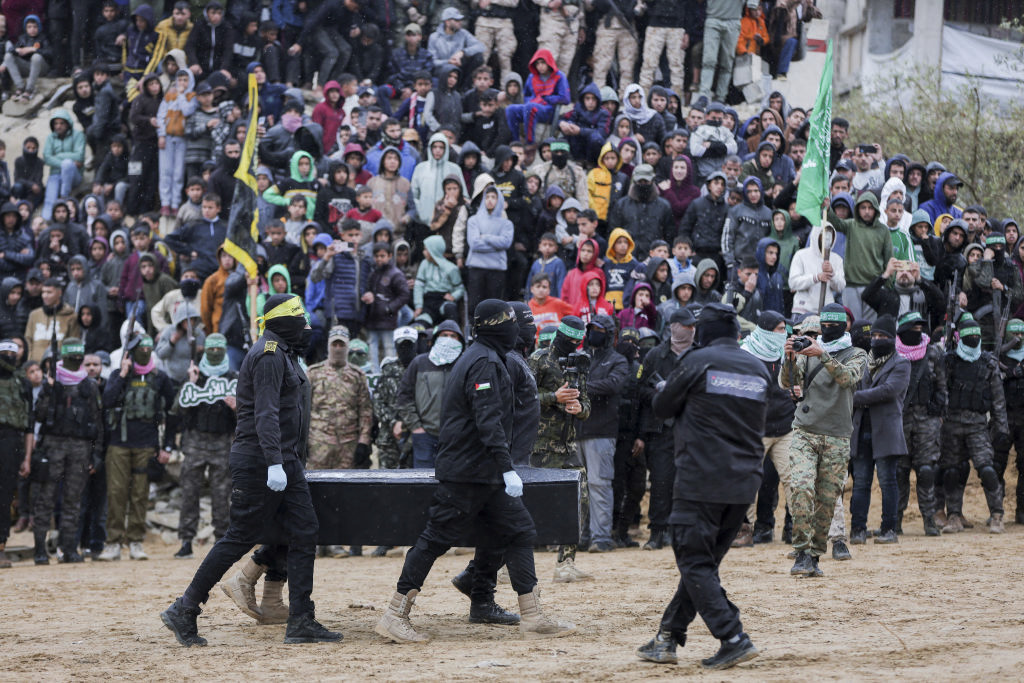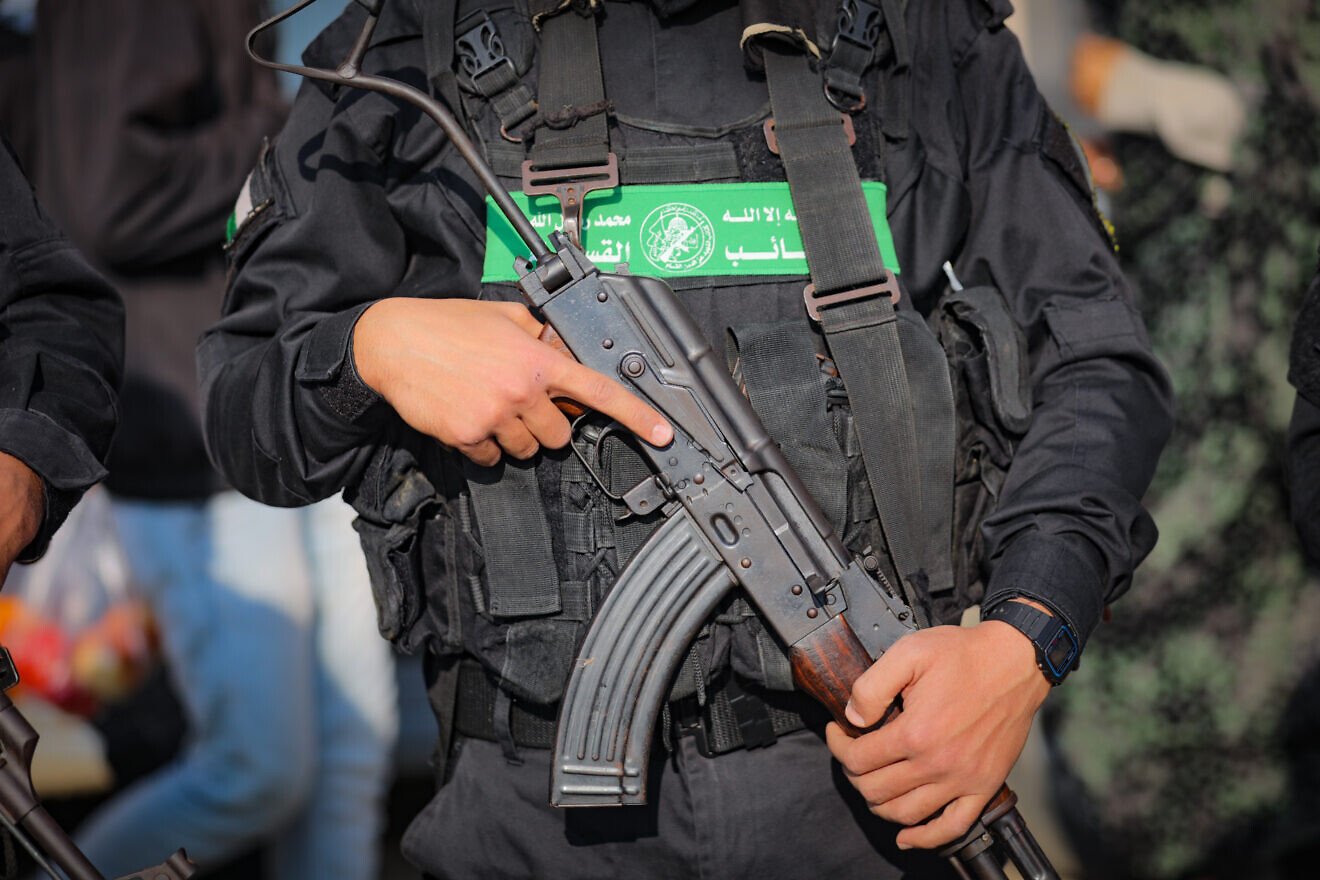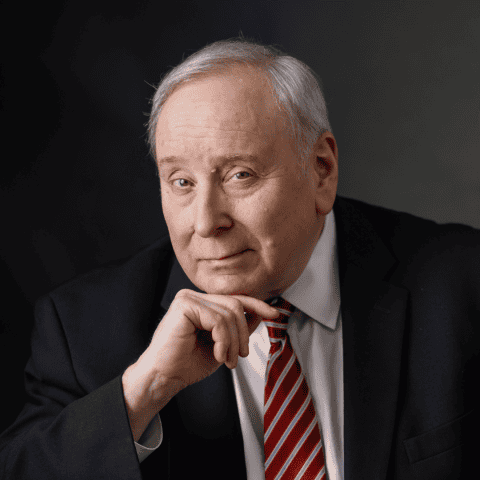 Inwazja Hamasu na Izrael 7 października 2023 r. była częścią dżihadu Hamasu w celu zniszczenia Izraela i zastąpienia go państwem islamistycznym. Dżihad nie ma na celu uwolnienia więźniów ani usunięcia osiedli i punktów kontrolnych, ale wymordowanie Żydów i unicestwienie Izraela. Iran i Hamas nie przejmują się tym, że dziesiątki tysięcy Palestyńczyków straci życie, dopóki mają pozwolenie na prowadzenie dżihadu przeciwko Izraelowi. Każde porozumienie, które utrzyma Hamas u władzy, utoruje drogę islamistycznym mordercom, gwałcicielom i zabójcom dzieci do przeprowadzenia jeszcze większej liczby masakr na Izraelczykach. Na zdjęciu: terroryści z Hamasu paradują z trumną zawierającą szczątki zamordowanego przez nich izraelskiego zakładnika przed tłumem zwolenników w Chan Junus w Strefie Gazy 20 lutego 2025 r. (Zdjęcie: Instagram)
Inwazja Hamasu na Izrael 7 października 2023 r. była częścią dżihadu Hamasu w celu zniszczenia Izraela i zastąpienia go państwem islamistycznym. Dżihad nie ma na celu uwolnienia więźniów ani usunięcia osiedli i punktów kontrolnych, ale wymordowanie Żydów i unicestwienie Izraela. Iran i Hamas nie przejmują się tym, że dziesiątki tysięcy Palestyńczyków straci życie, dopóki mają pozwolenie na prowadzenie dżihadu przeciwko Izraelowi. Każde porozumienie, które utrzyma Hamas u władzy, utoruje drogę islamistycznym mordercom, gwałcicielom i zabójcom dzieci do przeprowadzenia jeszcze większej liczby masakr na Izraelczykach. Na zdjęciu: terroryści z Hamasu paradują z trumną zawierającą szczątki zamordowanego przez nich izraelskiego zakładnika przed tłumem zwolenników w Chan Junus w Strefie Gazy 20 lutego 2025 r. (Zdjęcie: Instagram)
 Masakra Hamasu z 7 października jest częścią dżihadu dla zniszczenia Izraela
Masakra Hamasu z 7 października jest częścią dżihadu dla zniszczenia Izraela
Khaled Abu Toameh
Tłumaczenie: Małgorzata Koraszewska
Część ludzi w Izraelu domaga się, by premier Beniamin Netanjahu ustąpił i zgodził się na żądanie Hamasu zakończenia wojny w Strefie Gazy, tak jakby atak Hamasu na Izrael 7 października 2023 r. był po prostu kolejną rundą walk z tą wspieraną przez Iran palestyńską organizacją terrorystyczną.
Ci Izraelczycy nie potrafią zrozumieć, że masakra 7 października to tylko kolejny etap dżihadu (świętej wojny) islamistów przeciwko Izraelowi.
Hamas nie zaatakował Izraela 7 października 2023 r. tylko dlatego, że chciał uwolnić palestyńskich terrorystów z izraelskich więzień lub poprawić warunki życia Palestyńczyków pod jego rządami w Strefie Gazy. Atak, w wyniku którego zamordowano 1200 Izraelczyków i zraniono tysiące innych, a także porwano ponad 250 osób do Strefy Gazy, był częścią dżihadu Hamasu, którego celem jest zniszczenie Izraela i zastąpienie go państwem islamistycznym.
Dla Hamasu i innych organizacji islamistycznych konflikt z Izraelem nie dotyczy więźniów, osiedli ani punktów kontrolnych. Jest to konflikt dotyczący samego istnienia Izraela na Bliskim Wschodzie. Dżihad nie ma na celu uwolnienia więźniów ani usunięcia osiedli i punktów kontrolnych, ale mordowanie Żydów i unicestwienie Izraela.
Od czasu brutalnego przejęcia Strefy Gazy w 2007 r. Hamas nie zrobił nic, aby pomóc lokalnym mieszkańcom. Zamiast budować szpitale, szkoły i inwestować w gospodarkę, Hamas, z pomocą Iranu i Kataru, przeznaczył ogromne zasoby na produkcję broni, takiej jak rakiety i pociski, oraz na budowę ogromnej sieci tuneli w całej Strefie Gazy. W rezultacie Strefa Gazy szybko stała się jedną z największych baz dżihadu i terroryzmu na Bliskim Wschodzie.
Po masakrze 7 października Hamas wielokrotnie potwierdzał swoje zaangażowanie w dżihad przeciwko Izraelowi. 21 lutego 2025 r. Hamas oświadczył, że jego „determinacja i zdecydowanie do kontynuowania drogą dżihadu aż do wyzwolenia i zwycięstwa wzrosły”. Dla Hamasu „wyzwolenie” oznacza eliminację Izraela poprzez dżihad i „zbrojny opór” (terroryzm).
W dokumencie opublikowanym wkrótce po ataku z 7 października Hamas otwarcie przyznaje, że sprzeciwia się obecności Żydów w Izraelu. Dokument szczerze przyznaje, że konflikt nie rozpoczął się w wyniku Holokaustu ani gdy Izrael ogłosił niepodległość w 1948 r., ani 7 października 2023 r., ale 105 lat temu, „wliczając 30 lat brytyjskiego kolonializmu i 75 lat okupacji syjonistycznej”. Dokument wyjaśnia dalej, że Hamas „jest palestyńskim islamskim ruchem wyzwolenia narodowego i oporu. Jego celem jest wyzwolenie Palestyny i stawienie czoła projektowi syjonistycznemu”.
Karta Hamasu z 1988 r. podkreśla znaczenie dżihadu jako głównego środka Islamskiego Ruchu Oporu (Hamasu) do osiągnięcia swoich celów: należy prowadzić bezkompromisowy dżihad przeciwko Izraelowi i trzeba sprzeciwiać się wszelkim porozumieniom uznającym jego prawo do istnienia. Dżihad jest osobistym obowiązkiem każdego muzułmanina. Hamas, zgodnie ze swoją Kartą, postrzega „problem Palestyny” jako religijno-polityczną kwestię muzułmańską, a konfrontację izraelsko-palestyńską jako konflikt między islamem a „niewiernymi” Żydami. „Palestyna” jest przedstawiana jako święta ziemia islamska, więc surowo zabrania się oddawania nawet jednego centymetra z niej, ponieważ nikt (w tym arabsko-muzułmańscy władcy) nie ma do tego uprawnień.
Co znamienne, w Karcie zacytowano Hassana al-Bannę, założyciela Bractwa Muzułmańskiego w Egipcie w 1928 r., który powiedział: „Izrael powstanie i będzie istniał, dopóki islam go nie obali, tak jak obalił to, co było wcześniej”. Hamas jest palestyńską gałęzią Bractwa Muzułmańskiego.
Prezydent USA Donald J. Trump dobrze by zrobił, gdyby uznał Bractwo Muzułmańskie, źródło wszystkich islamskich organizacji dżihadystycznych, za Zagraniczną Organizację Terrorystyczną. Taki akt utrudniłby dalsze działanie tym krajom, które promują i finansują terrorystów dżihadystów.
Artykuł 2 Karty Hamasu stanowi:
„Ruch Oporu Islamskiego jest jednym ze skrzydeł Bractwa Muzułmańskiego w Palestynie. Ruch Bractwa Muzułmańskiego jest uniwersalną organizacją, która stanowi największy ruch islamski w czasach nowożytnych. Charakteryzuje się głębokim zrozumieniem, dokładnym pojmowaniem i całkowitym przyjęciem wszystkich islamskich koncepcji życia, kultury, wyznania, polityki, ekonomii, edukacji, społeczeństwa, sprawiedliwości i osądu, rozprzestrzeniania islamu, edukacji, sztuki, inflacji, nauki, wiedzy tajemnej i nawracania na islam”.
Od momentu założenia Hamas pozostał całkowicie wierny swojej Karcie. Hamas nigdy nie uznał prawa Izraela do istnienia; odrzucił wszystkie porozumienia pokojowe między Arabami a Izraelem, a co najważniejsze, nie tylko przeprowadził tysiące ataków terrorystycznych na Izrael, ale jego przywódcy przysięgli, że będą kontynuować ataki terrorystyczne „aż do unicestwienia Izraela”.
W zeszłym tygodniu pojawiła się informacja, że patron Hamasu, generał major Korpusu Strażników Rewolucji Islamskiej Iranu, Ebrahim Dżabbari, oświadczył, że irańska „Operacja Prawdziwa Obietnica 3 zostanie przeprowadzona we właściwym czasie, z precyzją i na skalę wystarczającą do zniszczenia Izraela i zrównania Tel Awiwu i Hajfy z ziemią”.
Masakra 7 października była tylko kolejnym etapem wysiłków grup islamistycznych zmierzających do wyeliminowania Izraela. Iran i Hamas nie przejmują się tym, że dziesiątki tysięcy Palestyńczyków straci życie, dopóki mają pozwolenie na prowadzenie dżihadu przeciwko Izraelowi.
To, co wydarzyło się 7 października, należy rozpatrywać w kontekście trwającego dżihadu Kataru, Iranu i Hamasu. Masakra 7 października była tylko kolejnym etapem wysiłków grup islamistycznych zmierzających do wyeliminowania Izraela. Po masakrach 7 października katarskie media rządowe konsekwentnie chwaliły masakry, a potem zapowiadały ich więcej.
Dwa tygodnie po ataku z 7 października przywódca Hamasu Chaled Maszaal przyznał, że jego grupa celowo poświęcała Palestyńczyków, aby osiągnąć cel w ramach dżihadu przeciwko Izraelowi: „Dobrze znamy konsekwencje naszej operacji z 7 października — powiedział . – Naród palestyński jest taki sam jak każdy inny naród. Żaden naród nie jest wyzwolony bez poświęceń”.
Każdy, kto wierzy, że Hamas porzuci dżihad w wyniku porozumienia o zawieszeniu broni, dopuszcza się skrajnego samooszustwa. Hamas nie wypełnił jeszcze swojej misji zniszczenia Izraela. Głównym celem Hamasu, zwłaszcza teraz, jest utrzymanie władzy po wojnie.
Grupa terrorystyczna w Gazie ponosi pełną odpowiedzialność za śmierć tysięcy Izraelczyków i Palestyńczyków. Każde porozumienie, które utrzyma Hamas u władzy, utoruje drogę islamistycznym mordercom, gwałcicielom i zabójcom dzieci do przeprowadzenia jeszcze większej liczby masakr na Izraelczykach.
Czas przypomnieć światu, co powiedział wysoki rangą funkcjonariusz Hamasu Ghazi Hamad po 7 października:
„Potop Al-Aksa [nazwa Hamasu na inwazję z 7 października] to dopiero pierwszy raz, a będzie drugi, trzeci i czwarty, ponieważ mamy determinację, siłę i możliwości walki… Izrael to kraj, dla którego nie ma miejsca na naszej ziemi. Musimy usunąć ten kraj”.
Niestety, nie ma alternatywy dla wykorzenienia Hamasu. W cywilizowanym świecie grupa terrorystyczna, która otwarcie dąży do ludobójczego zniszczenia, utraciła prawo do istnienia.
Khaled Abu Toameh – urodzony w 1963 r. w Tulkarem na Zachodnim Brzegu, arabski dziennikarz, któremu wielokrotnie grożono śmiercią. Publikował między innymi w “The Jerusalem Post”, “Wall Street Journal”, “Sunday Times”, “U.S. News”, “World Report”, “World Tribune”, “Daily Express” i palestyńskim dzienniku “Al-Fajr”. Od 1989 roku jest współpracownikiem i konsultantem NBC News.
Zawartość publikowanych artykułów i materiałów nie reprezentuje poglądów ani opinii Reunion’68,
ani też webmastera Blogu Reunion’68, chyba ze jest to wyraźnie zaznaczone.
Twoje uwagi, linki, własne artykuły lub wiadomości prześlij na adres:
webmaster@reunion68.com





